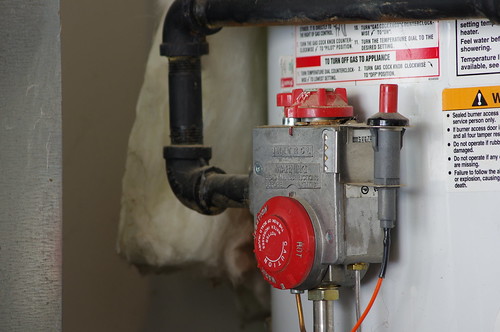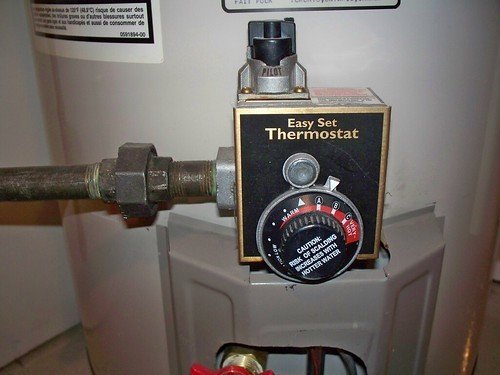A water heater is arguably one of the most significant plumbing units in your home. Each time you shower or turn on the sink to wash your hands with hot water, you can appreciate how your home’s water heater makes your life easier. Learn more about your water heater and what you should do if you experience any problems with it.
Tank-Type vs. Tankless Water Heaters

Image via Flickr by TJOwens
Usually located in a basement or a garage, tank-type water heaters are upright cylinders that heat water using gas or electricity. Both types of tank-style water heaters operate on similar heating principles but with slight differences. A gas heater relies on a burner with a flame, while an electric water heater has electric heating elements.
Unlike a tank-type water heater that stores hot water in an upright tank, a tankless water heater warms water on demand. When you turn on a faucet at the point of use, a tankless water heater starts activating to heat the water you need.
Water Heater Settings and Maintenance

Image via Flickr by jasonwoodhead23
For optimal heating, set the thermostat on your water heater between 120 and 140 degrees Fahrenheit. If you have small children in your household, keep the temperature at 120 degrees to prevent accidental scalding.
Each year, you should have a plumber inspect your water heater to ensure it is operating correctly. Your plumber should focus on the following key inspection points:
- Check the thermostat’s operation.
- Inspect the flow of combustion and ventilation air.
- Examine the pilot light and clean the burner parts on a gas water heater.
- Inspect the anode rod.
- Check the pressure-relief valve.
Depending on the mineral content of your area’s local water supply, you may need to periodically flush your water heater to remove lime, calcium, and magnesium buildup from inside the tank. Removing these mineral deposits can help improve the water heater’s operating efficiency. Suppose you allow these deposits to build up in your water heater tank over time. In this case, the deposits can cause uneven heating that may eventually cause leaks in a gas water heater or burn out the lower heating element in an electric water heater.
While you can flush your water heater on your own, you can also request a professional plumber to perform this service for you.
A typical tank-type water heater’s average life span is about 10 to 15 years. A tankless water heater, however, can operate for approximately 20 years with regular maintenance.
Handling Problems With Your Water Heater

Image via Flickr by Skakerman (Archive)
Two of the most common problems homeowners report with their water heaters are either not getting any hot water or getting too little hot water. Below we explain some of the common causes of these water heater problems.
What Do I Do If I’m Not Getting Enough Hot Water?
If your home’s hot water supply seems diminished, it may be due to one of the following scenarios:
- You may not be allowing enough time for cold water to reheat. If you’re using hot water in several places, such as the dishwasher, washing machine, and shower, at the same time, you can use up all of the hot water in the tank before the water has time to reheat. Taking extended showers can also impact the amount of hot water you receive.
- Your water heater may be too small for your household’s needs. If taking one long shower or running two appliances in your home at the same time is exhausting the hot water supply, then your water heater tank may be too small. Consider replacing your water heater with a larger one. Contact a plumber for professional help with sizing and installation.
- The water heater’s dip tube may be broken or have a crack in it. The dip tube is a plastic pipe inside the tank that runs vertically and delivers cold water to the tank’s bottom. If this tube becomes cracked or broken, it can allow cold water to mix with heated water in the tank’s upper portion. A plumber can replace the dip tube or, in the case of older water heaters, the entire water heater may need replacing.
What Do I Do If I’m Not Getting Any Hot Water?
If you’re not getting hot water anywhere in your home, then the following may be to blame:
- You may not have the thermostat set high enough. For optimal heating, set the thermostat at 120 degrees. If you believe the thermostat is malfunctioning, try turning up the thermostat to its highest setting and then turn on the hot water from a faucet. If the water heater burner doesn’t ignite or the water heater’s electric heating elements don’t turn on, contact a plumber to inspect the thermostat.
- If you have a gas water heater, the pilot light may have gone out. To check the pilot light, remove the metal cover at the bottom of the heater. If the pilot light is out, follow the instructions on the water heater tank to relight it. If you have an electric water heater, check the fuse or circuit breaker to ensure that the electricity is powering the water heater. If either the pilot light or electricity is malfunctioning, call a plumber for further inspection.
- If you detect an odor of gas near your gas water heater, turn the gas valve, located on the side of the water heater tank, to Off. Ventilate the area. If the smell does not go away, evacuate your home and call your local utility company from a neighbor’s house or your mobile phone. You may have a gas leak.
Does your water heater need a repair? Are you planning to install a new water heater in your home? Contact the plumbing professionals at Dahme Mechanical Industries, Inc. Our plumbing technicians can help you with any residential plumbing concern you may have, from performing emergency plumbing repairs to scheduling annual plumbing maintenance service. We work with you to ensure that the job gets done to your satisfaction. Call us today at 847-610-6846 to schedule an appointment.

